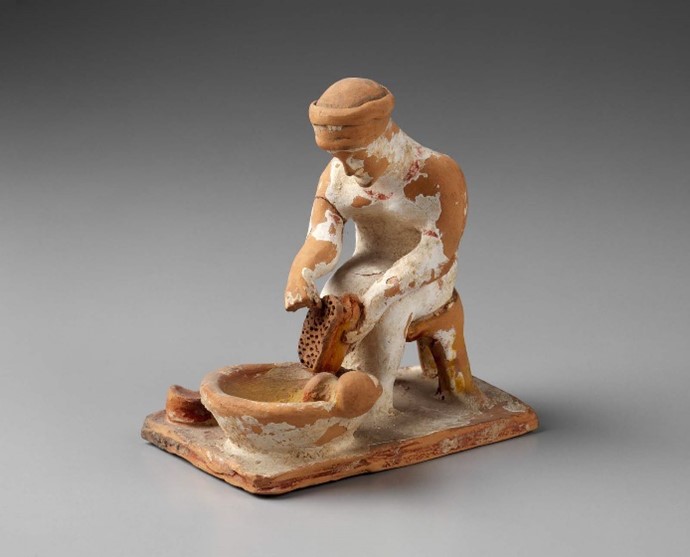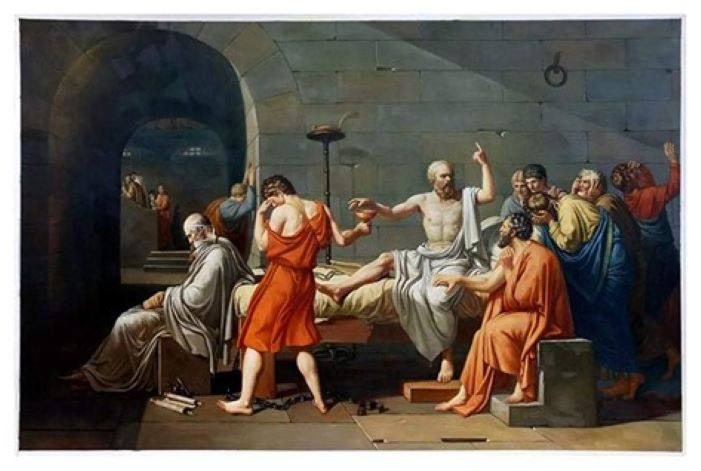Frisbee Sheffield shows how Plato offers us a programme for how to live well in dark times.
Plato’s Gorgias has been seen as a bitter and passionate work; “the work of an angry young man” (Schofield). The opening words are “to war and battle” (447a1). It might seem surprising that a work on rhetoric can generate such heat. But when the aspiring politician Callicles predicts that Socrates’s disdain for rhetoric will leave him unable to defend himself in court if unjustly charged with a crime, it becomes clear that the stakes could not be higher. Plato is taking issue with the way in which the political culture of radical democracy fosters practices of speech in which truth cannot emerge; just men like Socrates get put to death. Socrates will contrast two kinds of speech: pandering to a mass audience to win their vote, and his preferred mode of refutational dialogue, cast as a vigilant form of self-examination, in which unjust actions come to light.
As Callicles suggests, Socrates’ distinctive practice of speech ensured that he did not do wrong and died a just man, but that same practice had him suffer injustice. Herein lies the importance of an ethical question at the heart of the work: whether it is better to suffer or to do wrong. Socrates claims that “we should beware more of acting unjustly than of being treated unjustly, and that (more than anything else) what a person should practice, both in private life and public life, is not seeming to be good, but being good” (527b). So, two different practices of speech become central both to an ethical choice that structured Socrates’ life, and to an assessment of his death. Will we be persuaded that a practice of speech concerned with avoiding wrongdoing is better than aiming to secure safety from injustice by any means? Whether we take the bitterness of the Gorgias to be indicative of a sense of tragedy in its foretelling of Socrates’ death depends on where we stand on that very question.
So how did the stakes get so high? How are these speech practices characterised, and what is their relationship to justice? When the great rhetorician Gorgias offers a preliminary account of rhetoric as persuasion (453a), he has in mind the persuasion that happens in the lawcourts, assemblies, and any other meeting of citizens, and which is concerned with what is just and unjust (454b). So, a concern with justice seems to be part of the content of rhetoric (455a). But as Socrates goes on to show, on the grounds that it would not be possible to teach matters of importance to a large crowd in a short time, rhetoric can only produce conviction about such matters, not knowledge of this, or any other, subject matter. Furthermore, since it relies on pandering to a large crowd, and gratifying a mass audience to win their vote, it is reduced to catering to the pleasures of a crowd. Challenging the citizenry to think about what is in their best interests has no place if one’s overriding concern is to win over a large crowd. In a memorable image, Socrates claims that—just as the practice of the pastry chef stands to the art of medicine which is concerned with the good of health—so rhetoric stands to politics, which is concerned with justice. It is this same image to which Socrates returns when Callicles predicts that he will be unable to defend himself in court, claiming that he will be like a doctor, tried by a bench of children, on a charge brought by a cook (521e).
5th Century BCE terracotta image of a woman grating cheese
If the best way to hold sway over a large crowd is not to challenge those present, but to please them, then the point is that no substantial content about justice can emerge in these conditions. Indeed, though rhetoricians claim that their skill provides great power for the speaker, it is in fact reduced to a kind of servitude (521ab) in which one ends up “turning oneself into an exact copy of the political system in force where [they are] living” (513c). Without cultivating a culture of challenge to the dominant regime (whatever that may be), there is no resistance, and without resistance, acts of injustice, such as those that befell Socrates, are liable to arise.
It is not just the content of rhetoric, but also its form, that has a tenuous relationship to justice. The dialogue shows that there is a relationship between extended rhetorical speech making and an ethical view based on inequality and domination. When Gorgias claims that rhetoric provides “freedom for oneself and rule over others”, on the grounds that by means of this skill others are “enslaved” to the speaker (452e1-8), he exposes rhetoric as a form of control over others, which obtains between unequal parties. The relationship between justice and equality was strong in Greek thought. As Aristotle writes: “the just is equal, as everybody thinks’ (Nicomachean Ethics 1131a13-14; cf. Pol. III.9). These unequal relations of domination in speech are shown to be “the seed” from which “the poisonous fruit” of an unsavoury political view arises (as Dodds says in his 1959 commentary on Gorgias). One of Gorgias’ pupils, Callicles, argues that the world is divided into the strong and the weak where ‘the strong do what they can and the weak suffer what they must’. Callicles advocates taking more than one’s share at the expense of others (pleonexia), and is disdainful of equality (483b-d), just as rhetoricians take more than their share of discussion in a lengthy speech (makrologia) and seek to ‘enslave’ the masses through their speech. The parallels between Gorgias’ account of rhetoric and Callicles’ world-view suggests that rhetoric fosters adherence to unequal relations of domination, and in doing so provides fertile ground for pleonexia and injustice to take root.
Why this might be the case can be seen by comparison. Consider how Socratic dialogue (dialegesthai), which is contrasted with rhetorical display (epideixis, 447c1-3), expresses a commitment to justice. It is a practice of critical examination conceived as “asking and answering questions” (449b-c), that seeks not to persuade, but to challenge each other on our fundamental values, by “refuting and being refuted” (462a4-5; 447d4-5). It is presented as an accusatory endeavour, in which “[one] should himself be the first accuser both of [oneself] and of the rest of his family…to make sure that unjust actions come to light” (480b-d). This scrutiny of ourselves and the values we live by is the discursive practice that enables us to avoid injustice. The refutational aspect of dialogue undermines unreflective adherence to established criteria and values, its probing aspect makes the implications of one’s beliefs clear, and its public and social aspect delivers not only an alternative perspective to foster critical distance on one’s beliefs, but a degree of accountability to others. How many acts of injustice have been committed by those who adhere unreflectively to dominant norms and values? How many by people who fail to realise the implications of their actions, and how many by those who lose all connection to the common world in the isolation of their own mind? If unjust policies were subjected to the accountability demanded by such a refutational practice, how many would survive?
The Debate of Socrates with Aspasia (Nicolas-André Monsiau 1801)
Dialogue also embodies a commitment to justice in its distinctive form. Dialogical relations, unlike rhetoric, are relations without domination and the short question and answer format embodies equality between speakers. No-one should take more than their share of discussion, hence the fondness for ‘brief speech’ (449a1, b8, c1, c5, c7, 461d6, 462a4-5, 505e4-6). In this shared discursive endeavour, participants come together for common purpose (495a8-9, 498e10, 527d2-e5), which establishes a sense of community between them, as well as friendship in their common endeavour. Friendship is the recognition each gives to the other as an equal, such that one will allow the claims of each to be heard, take the time to consider their position fully, not “snatch at one another’s meaning on the basis of guesswork” (454c), and provide assistance in the development and scrutiny of their position. If a contradiction is exposed, this is an opportunity for further joint investigation (461b); one does not stand as victor to loser, but is on an equal footing of co-investigator when a puzzle arises. In the ideal conditions of dialogue, then, just relations are fostered between participants: each is given their due in dialogical exchange so opposing views can be properly understood, each keeps within bounds and does not take more than their share of discussion, and each collaborates in a spirit of friendship and community. If practices of speech stand as ‘seed’ to ‘fruit’, then Socratic dialogue generates values deeply opposed to the Calliclean world-view. There is indeed much at stake in the Gorgias: speech matters, ethically and politically speaking.
Since the trial and death of Socrates frames this account, one might wonder (with Callicles) whether Socrates is not taking his situation seriously enough. If the choice to think and speak in the way that he did led to his death, why shouldn’t we curry favour with the dominant regime to avoid similar harms (521a)? Here Socrates invites us to reflect on the notion of what harms matter to us most, arguing that the only harms that matter are harms to the soul. This does not rely on accepting any metaphysical or religious notion of the soul; it rests on the simple thought that one wants to live in agreement with oneself: “It would be better for me that my lyre or a chorus I directed should be out of tune and loud with discord and that multitudes of men should disagree with me rather than that I, being one, should be out of harmony with myself and contradict myself”. Living in harmony with oneself requires the examined life, that practice in which one ensures that one does not hold contradictory beliefs, by thinking them through with another who holds us to account. But as the contrast between the two speech practices has shown, if one is inclined to take more than one’s share at the expense of others, then one will be incapable of collaborative and friendly dialogue, and so thwart the opportunity to have one’s own lyre in tune, in other words, to live in agreement with one’s own self (482bc). And why live, even if only for one more day, with a disagreeable and conflicted self when you could live with a harmonious and better one instead?
The Death of Socrates by David (1787)
If the only harm that matters for Socrates is a harm to this state of the soul, then Socrates may have been undefended in the face of the Athenians, but he was undefeated. As he says in the Apology: “Rest assured that if you kill me, you wouldn’t harm me more than you harm yourselves” (30c7-30e1). What matters to Socrates is not living, but living in agreement with oneself, and by all accounts he did that. Whether the Athenians could live in agreement with themselves after what they did is another matter altogether.
Doubtless the trial and death of Socrates had a big impact on Plato, but it also gave him a way of life, and a practice that he defends in the Gorgias. Accepting that defence means one also accepts that no harm came to Socrates. It is as if Plato is saying, yes, Socrates had no ability to defend himself in a courtroom full of children run by pastry chefs, yes, he was put to death, and yes, I might be bitter about the loss of a dear friend, but this was no tragedy for Socrates for whom the only harm is harm to the soul; against that harm Socrates could defend himself by engaging in the practice of speech he advocates and demonstrates. “By practising truth, I really try, to the best of my ability, to be and to live as a good man, and when I die, to die like that. And I call on all other people as well, as far as I can… to this way of life, this contest, that I hold to be worth all the other contests in this life” (527de). Read in this way, the Gorgias is an inspiring account of a life well lived, set against the chaos of fifth century Athens, offering to dispel the shadow we, too, may feel, in dark times. To the extent that we see the Gorgias as a tragedy we are standing with Callicles. I will not stand with Callicles. Will you?
Dr Frisbee Sheffield is Fellow and Tutor of Downing College Cambridge. She has written extensively on ancient philosophy: she was Co-editor of The Routledge Companion to Ancient Philosophy (2013) and of Plato’s Symposium, introduction and critical notes for an edition in the Cambridge Texts in the History of Philosophy Series (2008). She published Plato’s Symposium: The Ethics of Desire (Oxford University Press) in 2006 and is currently writing a full-length study of Plato’s Phaedrus.




